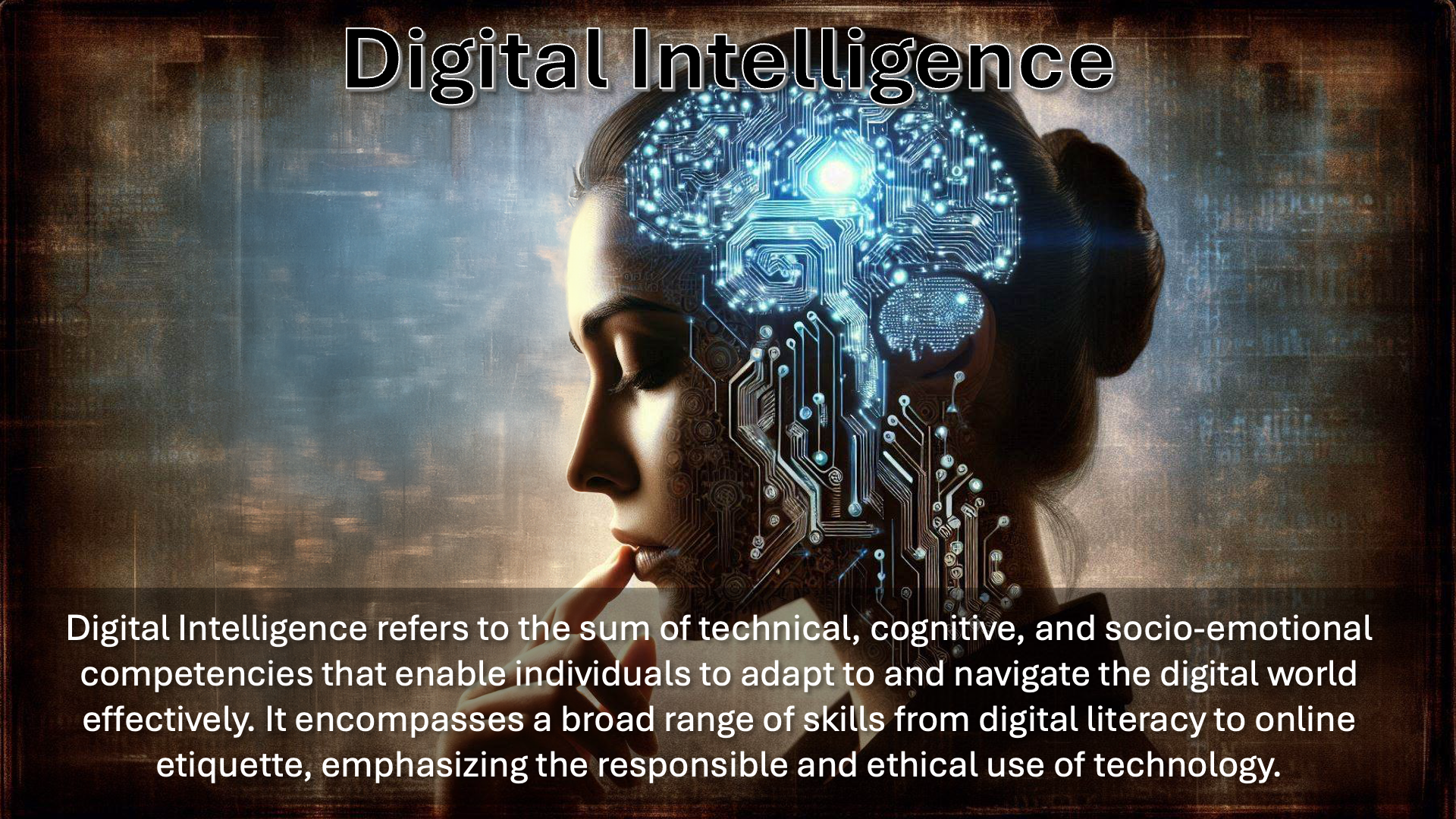Digital Intelligence (DQ)
Digital intelligence encapsulates the social, emotional, and cognitive abilities that empower individuals to meet the challenges and leverage the opportunities of the digital era.
What is Digital Intelligence?
Digital Intelligence refers to the ability of individuals, organizations, and systems to effectively utilize digital tools, technologies, and data to enhance decision-making and improve overall performance. It encompasses a range of skills and competencies, including:- Data Literacy: The ability to read, understand, create, and communicate data as information.
- Digital Skills: Proficiency in using digital tools and technologies, such as software applications, social media, and online collaboration platforms.
- Cybersecurity Awareness: Understanding the importance of protecting digital information and being aware of potential cyber threats.
- Analytical Skills: The capacity to analyze data, identify patterns, and draw meaningful insights from digital information.
- Adaptability: The ability to quickly learn and adapt to new technologies and digital environments.
Digital Intelligence is increasingly important in today's technology-driven world, where organizations and individuals must navigate vast amounts of information and leverage digital capabilities to innovate and succeed. The integration of digital intelligence into various sectors can lead to improved operational efficiency, enhanced customer experiences, and better strategic decisions.
- Snippet from Wikipedia: Digital intelligence
Digital intelligence is the sum of social, emotional, and cognitive abilities that enable individuals to face the challenges and adapt to the demands of life in the digital world. An emerging intelligence fostered by human interaction with information technology, it has been suggested that recognition of this intelligence will expand the scope of teaching and learning in the 21st century and all aspects of one's personal and professional lives.
The term is also used in businesses to refer to the information obtained through technologies and making use of them as an online marketing strategy and intelligence in the context of cyber security such as that mapped out by Global Commission on Internet Governance. Digital intelligence in this article refers to a new type of intelligence as a human capacity that combines knowledge, ways of knowing and the ability to interact effectively in a cultural or community setting.
- DQ Framework | DQ Institute —dqinstitute.org
Digital Intelligence (DQ) is a comprehensive set of technical, cognitive, meta-cognitive, and socio-emotional competencies that are grounded in universal moral values and that enable individuals to face the challenges and harness the opportunities of digital life. DQ has three levels, eight areas, and 24 competencies composed of knowledge, skills, attitudes, and values.
- Digital Citizenship
- The ability to use digital technology and media in safe, responsible, and ethical ways.
- Digital Creativity
- The ability to become a part of the digital ecosystem, and to create new knowledge, technologies, and content to turn ideas into reality.
- Digital Competitiveness
- The ability to solve global challenges, to innovate, and to create new opportunities in the digital economy by driving entrepreneurship, jobs, growth and impact.
DQ Framework is a Comprehensive, Adaptable, and Continuously Improving Digital Literacy and Skills Map for All Countries and Sectors
The Coalition for Digital Intelligence (CDI) is a cross-sector cooperative network of organizations from around the world that aims to improve global digital intelligence by coordinating efforts across educational and technology communities through multi-stakeholder collaborations.
Source: DQ Framework | DQ Institute
Related:
- Artificial Intelligence in Business
- Cybersecurity and Digital Trust
- Data Analytics and Decision Making
- Machine Learning Applications
- The Future of Work in a Digital Age
- Internet of Things (IoT) Innovations
- Cloud Computing Solutions
- Smart Technologies and Automation
- Digital Literacy and Skills Development
External links:
- Digital intelligence - Wikipedia — en.wikipedia.org
- What Is Digital Intelligence? | IEEE Journals & Magazine | IEEE Xplore — ieeexplore.ieee.org
-
- Digital intelligence is essential in today's world. We explain what it is, the skills and abilities and how you can boost it.
-
- By helping students develop their digital intelligence, schools can ensure tomorrow's workers adapt easily to change and cope with technological threats.
- The Power of Digital Intelligence for your Business — bocasay.com
- Digital Intelligence can help you to boost your competitiveness, improve your customer experience and reduce your costs.
